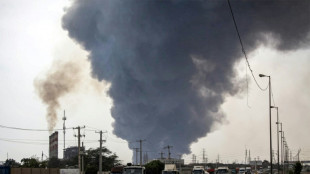
-
 Turkey's opposition says Erdogan's canal plan behind latest arrests
Turkey's opposition says Erdogan's canal plan behind latest arrests
-
Maresca hails 'nasty' Chelsea as top five bid stays alive

-
 Trump raises Putin doubts after Zelensky talks at pope's funeral
Trump raises Putin doubts after Zelensky talks at pope's funeral
-
Major blast at Iran port kills 4, injures hundreds

-
 Napoleon's sword to be sold at auction in Paris
Napoleon's sword to be sold at auction in Paris
-
Iran, US discuss nuclear deal in third round of talks

-
 Buenos Aires farewells native pontiff with call to action
Buenos Aires farewells native pontiff with call to action
-
Warholm sets hurdles world record at Diamond League, Holloway shocked

-
 US students 'race' sperm in reproductive health stunt
US students 'race' sperm in reproductive health stunt
-
Wikileaks founder Assange joins crowds for pope funeral

-
 Leader Marc Marquez claims Spanish MotoGP sprint victory
Leader Marc Marquez claims Spanish MotoGP sprint victory
-
Celtic win fourth successive Scottish Premiership title

-
 Jackson ends drought as Chelsea boost top five push
Jackson ends drought as Chelsea boost top five push
-
Warholm sets 300m hurdles world record in Diamond League opener

-
 Major blast at south Iran port kills 4, injures hundreds
Major blast at south Iran port kills 4, injures hundreds
-
Russia says retook Kursk from Ukraine with North Korean help

-
 Francis laid to rest as 400,000 mourn pope 'with an open heart'
Francis laid to rest as 400,000 mourn pope 'with an open heart'
-
Trump, Zelensky meet on sidelines of pope's funeral

-
 'Shared loss': Filipino Catholics bid Pope Francis farewell
'Shared loss': Filipino Catholics bid Pope Francis farewell
-
Families unable to reunite as India-Pakistan border slams shut

-
 Major blast at south Iran port injures hundreds
Major blast at south Iran port injures hundreds
-
Foreign carmakers strive for 'China Speed' to stay in race

-
 Pakistan says open to neutral probe into Kashmir attack after India threats
Pakistan says open to neutral probe into Kashmir attack after India threats
-
Hundreds of thousands at funeral mourn pope 'with an open heart'

-
 Quartararo sets Spanish MotoGP record to claim pole
Quartararo sets Spanish MotoGP record to claim pole
-
Hamas says open to 5-year Gaza truce, one-time hostages release

-
 Iran, US hold new round of high-stakes nuclear talks
Iran, US hold new round of high-stakes nuclear talks
-
Up at dawn for front-row seat to history at Francis's funeral

-
 Pakistan ready to 'defend sovereignty' after India threats
Pakistan ready to 'defend sovereignty' after India threats
-
Huge crowds flock to Vatican for Pope Francis's funeral

-
 Xi says China must 'overcome' AI chip challenges
Xi says China must 'overcome' AI chip challenges
-
Indian army says new exchange of gunfire with Pakistan

-
 Epstein accuser Virginia Giuffre takes own life in Australia: family
Epstein accuser Virginia Giuffre takes own life in Australia: family
-
Hundreds of buildings damaged, dozens injured in 6.3 Ecuador quake

-
 India and Pakistan's Kashmir fallout hits economy too
India and Pakistan's Kashmir fallout hits economy too
-
Francis's funeral to be grand farewell to 'pope of the poor'

-
 Pogacar faces defiant Evenepoel at Liege-Bastogne-Liege
Pogacar faces defiant Evenepoel at Liege-Bastogne-Liege
-
Chelsea eye great escape against Barcelona in Women's Champions League

-
 Iran, US to hold new round of high-level nuclear talks
Iran, US to hold new round of high-level nuclear talks
-
'Energy and effort' pay off for Reds as Blues' woes continue

-
 Albatross and closing birdie lift China's Liu to LPGA Chevron lead
Albatross and closing birdie lift China's Liu to LPGA Chevron lead
-
On the horizon? Wave of momentum for high seas treaty

-
 New to The Street Launches For The Causes(TM) Monthly Awareness Segments: Offering Free National Media to Charities and Organizations
New to The Street Launches For The Causes(TM) Monthly Awareness Segments: Offering Free National Media to Charities and Organizations
-
Top Mistakes to Avoid When Building Credit History

-
 Developing countries should fast-track US trade deals: World Bank president
Developing countries should fast-track US trade deals: World Bank president
-
Grizzlies' Morant 'doubtful' for must-win game 4 v Thunder

-
 Trump in Rome for pope funeral in first foreign trip of new term
Trump in Rome for pope funeral in first foreign trip of new term
-
Trump says Russia-Ukraine deal 'very close' after new Kremlin talks

-
 US rookies lead PGA pairs event with McIlroy and Lowry in hunt
US rookies lead PGA pairs event with McIlroy and Lowry in hunt
-
Trump tariff promises get a reality check


February marks 9th straight month of record-smashing global heat: climate monitor
Last month was the warmest February on record globally, the ninth straight month of historic high temperatures across the planet as climate change steers the world into "uncharted territory", Europe's climate monitor said Thursday.
The last year has seen an onslaught of storms, crop-withering drought and devastating fires, as human-caused climate change -- intensified by the naturally-occurring El Nino weather phenomenon -- stoked warming to likely the hottest levels in over 100,000 years.
Copernicus Climate Change Service (C3S) service last month said the period from February 2023 to January 2024 marked the first time Earth had endured 12 consecutive months of temperatures 1.5 degrees Celsius hotter than the pre-industrial era.
That trend has continued, it confirmed in its latest monthly update, with February as a whole 1.77C warmer than the monthly estimate for 1850-1900, the pre-industrial reference period.
Temperatures spiked across swathes of the planet in February, from Siberia to South America, with Europe also registering its second warmest winter on record.
In the first half of the month, daily global temperatures were "exceptionally high", Copernicus said, with four consecutive days registering averages 2C higher than pre-industrial times -- just months after the world registered its first single day above that limit.
This was the longest streak over 2C on record, said C3S director Carlo Buontempo, adding the heat was "remarkable".
But it does not mark a breach of the 2015 Paris climate deal limit of "well below" 2C and preferably 1.5C, which is measured over decades.
Copernicus' direct data from across the planet goes back to the 1940s, but Buontempo said that taking into account what scientists know about historical temperatures "our civilization has never had to cope with this climate".
"In that sense, I think the definition of uncharted territory is appropriate," he told AFP, adding global warming posed an unprecedented challenge to "our cities, our culture, our transport system, our energy system".
- Ocean records -
Sea surface temperatures were the highest for any month on record, Copernicus said, smashing the previous heat extremes seen in August 2023 with a new high of just over 21C at the end of the month.
Oceans cover 70 percent of the planet and have kept the Earth's surface liveable by absorbing 90 percent of the excess heat produced by the carbon pollution from human activity since the dawn of the industrial age.
Hotter oceans mean more moisture in the atmosphere, leading to increasingly erratic weather, like fierce winds and powerful rain.
The cyclical El Nino, which warms the sea surface in the southern Pacific leading to hotter weather globally, is expected to fizzle out by early summer, Buontempo said.
He added that the transition to the cooling La Nina phenomenon may happen faster than expected, potentially decreasing the chances that 2024 will be another record-breaking year.
- Fossil fuelled heat-
While the El Nino and other effects have played a role in the unprecedented recent heat, scientists stressed that the greenhouse gas emissions that humans continue to pump into the atmosphere were the main culprit.
The UN's IPCC climate panel has warned that the world will likely crash through 1.5C in the early 2030s.
Planet-heating emissions, mainly from the burning of fossil fuels, continue to rise when scientists say they need to fall by almost half this decade.
Countries at UN climate negotiations in Dubai last year agreed to triple global renewables capacity this decade and "transition away" from fossil fuels.
But the deal lacked important details, with governments now under pressure to strengthen their climate commitments in the short term and for beyond 2030.
"We know what to do -- stop burning fossil fuels and replace them with more sustainable, renewable sources of energy," said Friederike Otto, of the Grantham Institute for Climate Change and the Environment, Imperial College London.
"Until we do that, extreme weather events intensified by climate change will continue to destroy lives and livelihoods."
O.M.Souza--AMWN



